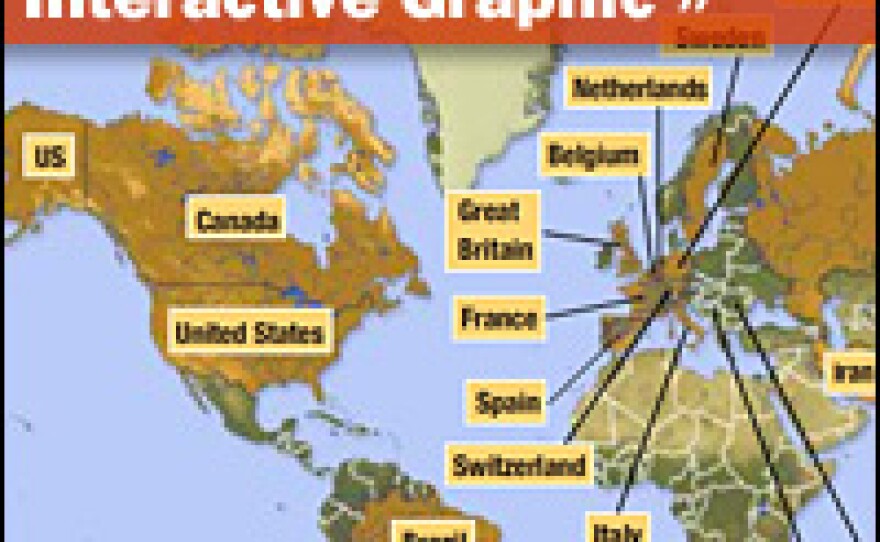
The CIA told lawmakers Thursday that a secret facility in Syria that was bombed by Israeli warplanes last year was a nearly finished nuclear reactor — and that evidence shows North Korea was assisting with the project.
That revelation comes at a sensitive time in the negotiations between Washington and Pyongyang designed to rid North Korea of its nuclear weapons. Progress toward that end has been significant, but the process has stalled over a requirement that North Korea provide a full inventory of all its nuclear activities, including whether it helped other nations acquire nuclear technology.
The United States has been working intensively to implement the North Korean denuclearization agreement for more than a year. Those efforts are taking place within the so-called six-party process, involving China, Japan, Russia and South Korea, as well as the U.S. and North Korea.
The first phase required the disabling of the facilities at Yongbyon that produce plutonium for nuclear bombs. That has largely been achieved, according to American experts who visited the facilities and observed the North Koreans taking concrete steps to damage or dismantle them.
That production is the most important aspect of North Korea's nuclear activities. It possesses enough plutonium to make at least eight — and maybe a dozen — bombs, and the North carried out one nuclear test explosion in 2006.
In the second phase of the process, North Korea is supposed to provide a complete inventory of its nuclear activities. But so far it has come up short, says Evans Revere, president of the Korea Society.
"North Korea has apparently agreed that it will acknowledge, in some way, a series of U.S. concerns related to the two major stumbling-block issues that have prevented further progress in the six-party talks," Revere says.
The two stumbling blocks are possible uranium enrichment in North Korea and the country's proliferation activities — whether it has helped other nations acquire nuclear technology.
Administration Under Fire
The United States recently held a series of talks with the goal of completing the second phase. But North Korea apparently will give only a nod to U.S. concerns. And in exchange, it wants the United States to lift economic sanctions and remove Pyongyang from the list of states that sponsor terrorism.
It appears to be a deal the Bush administration is willing to make, but not without some fierce opposition, Revere says.
"These agreements have been long in coming," he says. "They've been very difficult to achieve through negotiations in Beijing and Geneva, and most recently in Singapore. There has not been a lot of detail out in public about the nature of these talks. But what little detail there is has been picked up on by various parties in Washington and subjected to some criticism."
Critics on the right fault the potential deal as an enormous concession to North Korea — a state, they say, that cannot be trusted to carry out any commitment it makes and that, at any rate, has no intention of giving up its nuclear weapons. Critics on the left say it's essentially a deal the Bush administration could have gotten five years ago, when North Korea's nuclear weapons program was frozen and before it carried out a nuclear test.
When questioned about this Saturday, President Bush seemed impatient with the criticism.
"They have yet to make a full declaration," Bush said. "Why don't we just wait and see what they say before, you know, people go out there and start giving their opinions about whether or not this is a good deal or a bad deal."
The president was at Camp David, hosting a visit from new South Korean President Lee Myung-bak, who insisted North Korea must provide a full and complete declaration of its nuclear activities. But speaking through an interpreter, Lee, too, appealed for patience.
"Korea and the United States do not harbor any hostile intent toward North Korea," he said. "We both agree to work together to help North Korea escape international isolation and to improve the lives of the North Korean people."
Undermining Negotiations?
But it remains to be seen whether Thursday's intelligence briefing in Congress will help or hinder the negotiations.
Jeffrey Lewis, who runs the Web site armscontrolwonk.com, says it's clear that the briefing is meant to undermine the negotiations.
"Members of Congress who have been pushing hardest to have this information declassified — or at least put out into the public domain in some form or another — are those who want to make the point that North Korea can't be trusted," Lewis says.
Still, U.S. officials were in Pyongyang just this week making the argument to the North Koreans that now is the time to provide a full accounting of their nuclear program.
Copyright 2022 NPR. To see more, visit https://www.npr.org. 9(MDAzMjM2NDYzMDEyMzc1Njk5NjAxNzY3OQ001))







